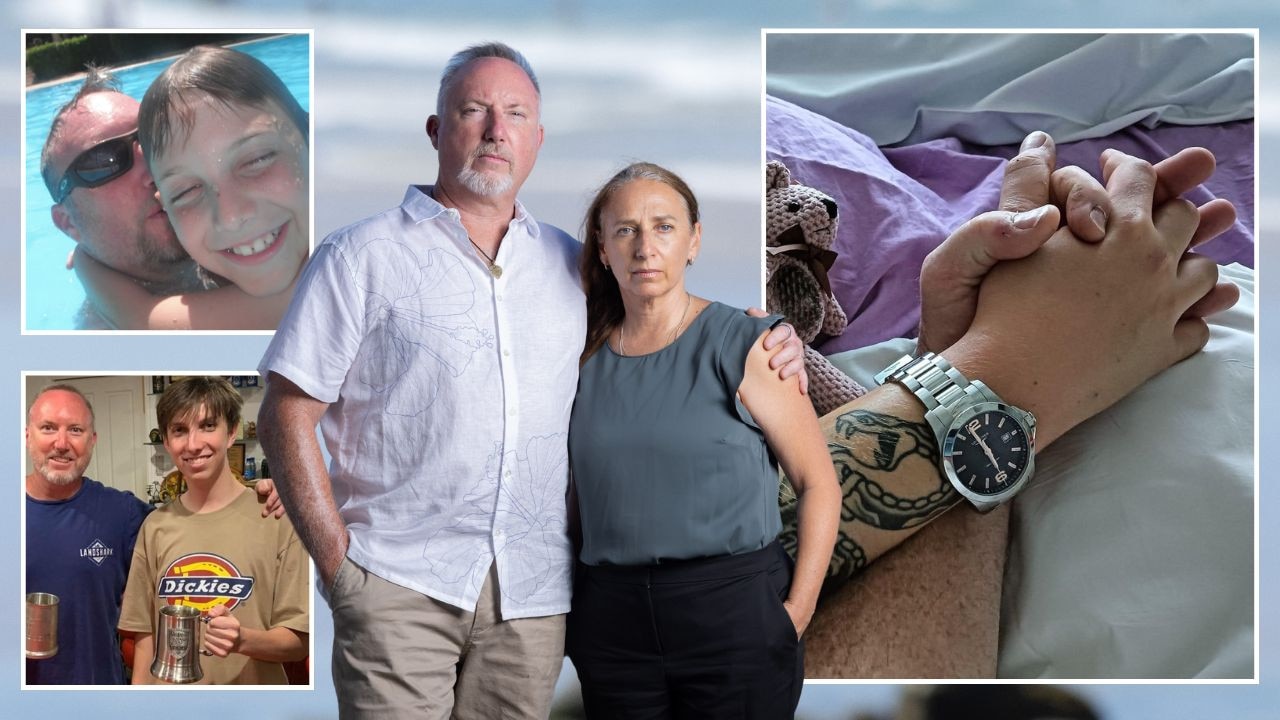‘Impossible to overstate the toxicity’: Norman Swan on his strict age limit for social media
You’re deluding yourself if you think allowing your child to sip alcohol at the table teaches them sensible drinking. The same applies for social media, Norman Swan explains.

News
Don't miss out on the headlines from News. Followed categories will be added to My News.
Cyberbullying, grooming, inappropriate content. Strictly no child should be on social media before this age, physician and journalist Norman Swan argues.
SOCIAL MEDIA
I’ve looked long and hard for any substantial reason supported by research as to why a child aged 10 or younger should be on any social network and can’t find one.
We tear our hair out as a community and parents about rising rates of childhood anxiety and eating disorders, yet one of the most likely causes is in the hands of our children. Social media allow and indeed encourage children and adolescents to compare themselves to others.
There’s always someone thinner, leaner, richer or more beautiful. Every worry about screens and children is intensified and crystallised in social media: short, episodic, “addictive”, uncurated and potentially toxic interactions with a network of unknown people or synthetic humans who are software/AI constructs.

And just as you as a parent – yourself a child of the digital age – think you’ve got a handle on social … it’s already moved on.
Let me remind you, we’re talking about kids up to age 10.
Social media are a waste of a child’s playtime/activity and a lost opportunity for social interaction with real kids and adults.
While we often think our children are prodigies and mature beyond their years, the simple, developmental truth is that children don’t have the cognitive capacity to navigate the messaging that they can be exposed to.
And once you’ve succumbed to the nagging for a mobile phone, the risks go up.
You’re the adult, they’re the child.
Set explicit rules and limits.
Make sure your child gets explicit permission from you before creating a profile on any site. Educate yourself on these social media platforms and how they work.
Above all, make sure they know you’re the first port of call for anything that might go awry online, like cyberbullying, grooming or being exposed to inappropriate content. They can talk to you, no judgment.
No child should be on social media – probably including chat groups – before the age of 13.

AGE LIMITS
Most social media platforms require children to be at least 13 years old to create a profile, but that’s almost impossible to police. All a child has to do is lie about their birth year. A UK report from their communications regulator Ofcom in 2022 found:
• The majority of children under 13 had a profile on at least one social media app or site: 33 per cent of 5-7 year olds had a profile, and 60 per cent of 8-11 year olds.
• Mobile phones or tablets were the dominant devices for children to use when accessing social media and in children aged 3-17 (yes, three to 17).
• Their dominant online activity was viewing video sharing platforms, with YouTube being the most popular, followed by TikTok.
• With video gaming online, 60 per cent of children played video games and significant proportions played with people they didn’t know and chatted with them.
• Most kids said they could detect fake information and advertising but when they were tested on this, that was not true.
• 36 per cent said they’d seen something worrying, but only 60 per cent would always tell their parents about it.
• 84 per cent of 8-17 year olds said they’d been bullied online, compared to 61 per cent face-to-face.
• One in five had used the internet in privacy mode or had got rid of their browsing history.

Australian data on children’s use of mobile phones is a bit out of date at the time of writing but show similar patterns of use in terms of gaming and access to apps.
Some authorities – including Dr Vivek Murthy, the US Surgeon General at the time of writing – have argued that even 13 is too young to be on social media and risks harm.
In 2023, Dr Murthy called for parents to “band together” to draw a line in the sand at age 16 or 17. In the US state of Utah, the governor signed a law requiring explicit parental permissions for anyone under 18 wishing to join social media platforms, although it’s unclear how such rules can be policed. While there are ongoing attempts to hold social media giants to account through legislation and legal challenges, it’s safest to assume that for the most part, as a parent you’re on your own.
So it’s on you to prepare for your child’s life online. You have a duty of care that TikTok, YouTube (Google) or Meta will never admit to despite their protestations.

GENDER DIVIDE
Boys and girls are exposed to very different online worlds. If you’re a parent who cares how your child’s gender identity is moulded, you need to pay attention to social media exposure. And if you yourself are obsessed with influencers and social media, your kids will notice and mimic.
Males are more likely to be drawn to influencers on YouTube. For females, it’s Instagram. Boys are more likely to use social media for competitive activity bonding, while girls report greater use of social media for emotional bonding, appearance validation and social compensation.
Boys are flocking to content about gaming and sports. While sporting stars tend to be exposed to the glare of the mainstream, gamers can get away with much more.
There’s been plenty of controversy surrounding popular online personalities – from PewDiePie’s anti-Semitic jokes, to entire channels where women never make an appearance. Influencers, especially male influencers, are rewarded for their extreme views and outrageous stunts. They promote risk-taking behaviours and pranks, and encourage viewers to mimic them.
Boys aged 7-16 report spending more than two hours a day on YouTube, according to Ofcom, so it’s worth asking who they’re spending those two hours with.
In the meantime, a majority of girls are seeking out beauty, fashion and food content. There’s study after study linking these kinds of social media with feelings of inadequacy, leading to depression, anxiety, body dissatisfaction and disordered eating.
The constant consumption of beauty, fashion and food content might seem innocuous, but it can contribute to a range of issues during adolescence. The concerns do cross the gender divide but there’s still a divide.
Gender is one of the most basic pieces of information that social media sites collect. It’s often the starting point for algorithms that have a nasty habit of entrenching our differences.

THE CYBER BULLY
It’s impossible to over-estimate the toxicity of bullying and its consequences.
Social media are platforms for such abuse. According to Australia’s eSafety Commissioner, 44 per cent of Australian youth had a negative online experience in the six months leading up to the survey, while 15 per cent of them had received threats or abuse.
There are many forms of cyberbullying. Peers may send hurtful messages, share embarrassing photos or videos, or spread gossip.
There’s also “catfishing” where the bully creates a fake account and engages in conversation, building a fake relationship or sending anonymous threats. Just as in real life, being made to feel left out can happen online (such as being excluded from group chats).
As this bullying is over the internet, it’s hard to escape when a child has unfettered access to online environments.
What’s essential, though, is that kids have someone they can trust to be non-judgmental who they can turn to if they become a target. If the child doesn’t believe they’ll be adequately supported, they’re more likely to keep the bullying to themselves. Especially if they believe it will lead to restrictions on their online time. It needs no screens open and unbiased communication.

SLEEP
Screens and social media obsessions at night can mess up kids’ sleep with potentially significant effects on their physical and mental health. No screens before bed and none in the bedroom and hopefully by now you’ve locked up the tablet and mobile phone ’til they’re 13.
SO HOW DO YOU PREPARE?
While regulators think 13 is the appropriate age for kids to be on social media, children much younger are already participating.
Is your nine or 10 year old nagging you about making an Instagram profile? “Why am I the only one who doesn’t have one? Why are you the only parents who won’t allow me one?” You know the script.
Do you give in so you can monitor their social media use, or do you hold out?
You know your child best but given the evidence, delaying your child from having a social media profile for as long as possible seems to be the best approach.
When you can’t put off social media participation any longer, there are questions you’ll need to ask. The first is this: Is my child mature enough to be on social media? In the perfect world you would be able to shield your child from cyberbullying, inappropriate content and criminals who seek out children.
But assuming that you can’t guarantee that, no matter how hard you try, what next? It’s probably wise to use the first steps in social media as a “developmental opportunity” to have constructive conversations about “what ifs”, including how to recognise when social media are becoming toxic and what to do, including coming back to you for non-judgmental advice and discussion. It’s okay for them to admit fears.

You’re deluding yourself if you think that allowing your child to sip alcohol at the table teaches them sensible drinking.
It’s the opposite. So don’t fool yourself that early access to social media will teach them sensible use. You’re putting your child on a locomotive driven by others with their own motives, which do not include your child’s wellbeing.
However, it is important that children learn how to deal with negative experiences online before they face them.
It might be their first instinct to hide cyberbullying, or exposure to abusive content, because of embarrassment or fear of repercussions – like having their own access to screen time revoked.
Make it clear that their safety is your top priority, but that in return the boundaries you’ve agreed to will be respected.
Children also need to know the importance of protecting their personal information. This means not divulging their address or where they go to school. It also means being aware of the data social media platforms collect and how they use it.

This might take some example-setting on your part, maybe a password manager, and remove any images from your own social media accounts that you wouldn’t want your child to see.
Set ground rules about posting. Establish what kind of content they can and can’t post. If your child wants their own profile, especially when they’re as young as 10 years old, make sure it’s moderated by a parent.
Filter any posts, comments and friend requests, and keep an open channel of (unbiased) conversation. You don’t want to tiptoe around your child, but if they sense judgment, they might resort to secrecy.
THE BOTTOM LINE?
Be envious of previous generations of parents who didn’t have to deal with this stuff. The key messages from the evidence appear to be: delay social media participation for as long as possible.

Be part of the process of your kids getting online and show them the do’s and don’ts. Keep up the non-online real world activities of childhood, especially where you’re involved. Be accessible in a non-judgmental way for your kids to come forward to you with issues, trusting you’ll be a problem solver.
If you’re obsessed with social media, don’t be surprised when they are but at an age where they’ll have trouble dealing with what bombards them.
More Coverage
Originally published as ‘Impossible to overstate the toxicity’: Norman Swan on his strict age limit for social media




